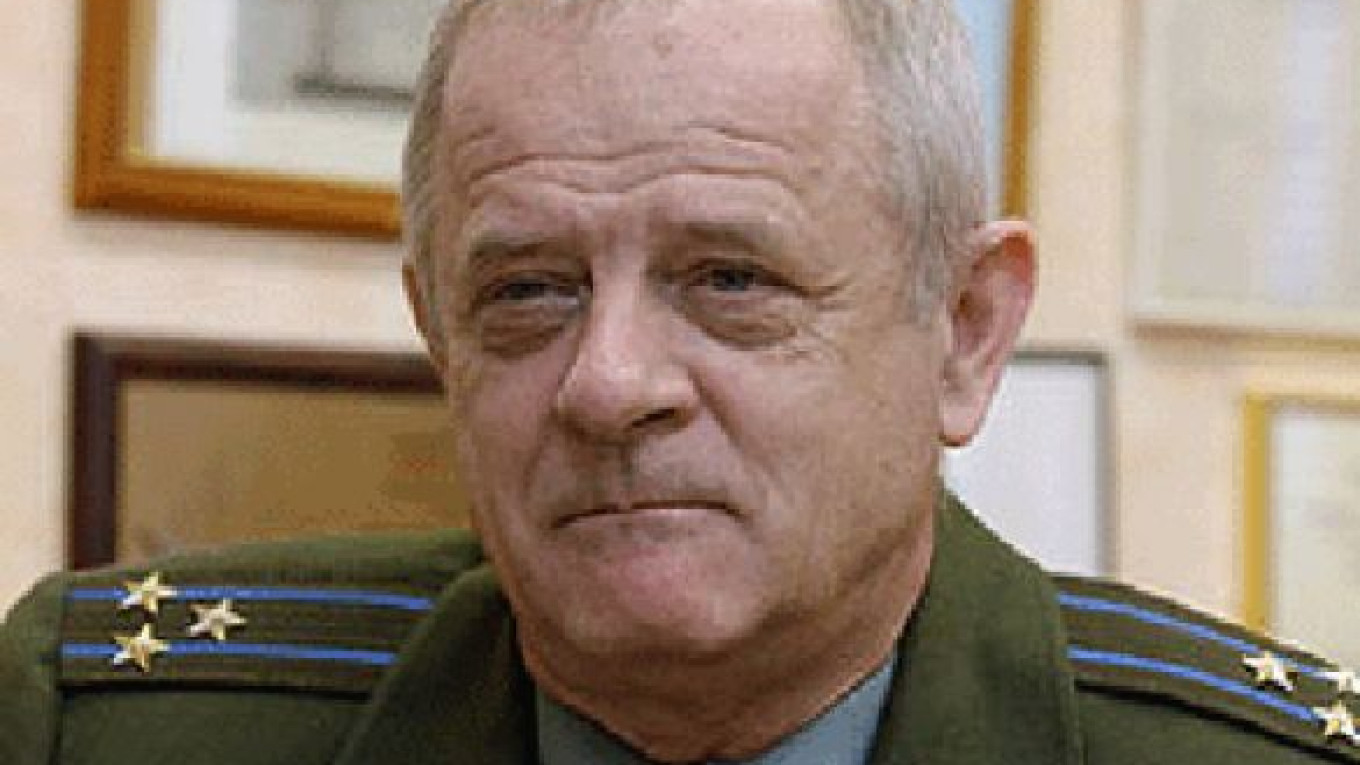Former military intelligence ??olonel Vladimir Kvachkov, once a suspect in an assassination attempt on Rusnano chief Anatoly Chubais, was sentenced Friday to 13 years in prison on charges of preparing a coup.
Nationalist activist Kvachkov, 64, was arrested on Dec. 23, 2010, on suspicion of planning an armed revolt and involving people in terrorist activities. His arrest came one day after the Supreme Court found him not guilty in a 2005 attack on the cortege of Chubais, who at the time headed the Unified Energy System.
"Judging by the way the verdict is written … it's Chubais' revenge," said Kvachkov's lawyer Oksana Mikhalkina after Friday's sentencing. Kvachkov has denied the charges.
Kvachkov, smiling slightly, appeared calm as the judge read the verdict. Officers marched him away as soon as the trial adjourned, not giving him any time to talk to his wife or lawyers.
His alleged co-conspirator, 62-year-old former police official Alexander Kiselyov, was also sentenced Friday, receiving 11 years behind bars.
Investigators say the pair's planned revolt was supposed to start in August 2010 at Kovrov, a small town in the Vladimir region, where Kvachkov and his supporters planned to seize local weapons depots and give guns to people. His accomplices prepared similar endeavors in several other regions, investigators said.
The group allegedly hoped to trigger a chain reaction of revolts across Russia, allowing rebels to seize power in Moscow. The judge said at Friday's hearing that the coup in Moscow was supposed to be undertaken by 1,500 to 2,000 people.
Mikhalkina said investigators used Kvachkov's nationalist views, which he has described in detail in several books, as evidence that he was planning an armed rebellion. Kvachkov is sharply opposed to what he sees as foreign influence in Russia and is an avowed anti-Semite.
"The verdict is dangerous in that every conversation around the kitchen table, every utterance may now be interpreted as an attempted coup," Mikhalkina said.
The judge said Kvachkov was being sentenced not for his political views but for his criminal activities, although he said the ruling took into account Kvachkov's behavior at previous hearings, where he had proclaimed his nationalist beliefs.
After his arrest, Kvachkov immediately alleged that Chubais had orchestrated the charges in retaliation for the not-guilty verdict in the attack on him.
The assassination attempt on Chubais took place on a Moscow region highway in 2005. A bomb exploded on the road, and his cortege was pelted with bullets from machine guns. Chubais escaped unscathed.
Kvachkov and two alleged accomplices were accused in the attack, but a court ruled that there was not enough evidence of their involvement.
Chubais, a member of former President Boris Yeltsin's inner circle and one of the planners of the privatization of state assets in the 1990s, wrote on his blog Friday that he harbored no hard feelings against Kvachkov and that he had nothing to do with Kvachkov's trial.
"I hope that the trial was fair and that Kvachkov's age and past honors were taken into account by the court," he wrote. "But judging by the views that Kvachkov promotes so actively, he is a dangerous fascist extremist who is ready to sacrifice people's lives for his mad ideas. I'm not surprised that he was planning a coup."
Kvachkov's lawyers said the files from the case implicating him in the assassination attempt on Chubais were transferred to the case accusing him of planning a coup, which they said was illegal and demonstrated Chubais' involvement.
Chubais wrote that Kvachkov had demonstrated his "inadequacy" by accusing him of influencing the results of the trial.
"Obviously, I didn't have any relation either to the investigation or the trial, which I was not interested in at all," he wrote.
Mikhalkina said that although Kvachkov's lawyers had little hope that the verdict would be changed, they would appeal it anyway. She said they were more optimistic about obtaining their defendant's release.
"The verdict wasn't a surprise for him. He understood that there wouldn't be a not guilty verdict with such a punitive state system," Mikhalkina said.
Kvachkov's wife, Nadezhda, alleged that the case had been invented by incompetent investigators and was based on her husband's nationalist views.
"There was no evidence in this case at all. The judge supported his arguments only with my husband's nationalist proclamations at the previous hearings," she said after the trial. "The whole case was fabricated, and the failures of the investigation were eliminated in court."
The judge did not deprive Kvachkov and Kiselyov of their military ranks and honors, as the prosecutor requested. The court also ordered investigators to return money taken from Kvachkov's apartment in 2010 to his wife.
"But this can't compensate for the fact that Nadezhda literally lost her husband," Mikhalkina said.
More than 20 elderly supporters of Kvachkov came to support him at the trial, shouting "hail, Russia's hero!" when the judge announced the verdict. They then grappled with police officers in the courtroom and shouted "shame."
Contact the author at e.kravtsova@imedia.ru
A Message from The Moscow Times:
Dear readers,
We are facing unprecedented challenges. Russia's Prosecutor General's Office has designated The Moscow Times as an "undesirable" organization, criminalizing our work and putting our staff at risk of prosecution. This follows our earlier unjust labeling as a "foreign agent."
These actions are direct attempts to silence independent journalism in Russia. The authorities claim our work "discredits the decisions of the Russian leadership." We see things differently: we strive to provide accurate, unbiased reporting on Russia.
We, the journalists of The Moscow Times, refuse to be silenced. But to continue our work, we need your help.
Your support, no matter how small, makes a world of difference. If you can, please support us monthly starting from just $2. It's quick to set up, and every contribution makes a significant impact.
By supporting The Moscow Times, you're defending open, independent journalism in the face of repression. Thank you for standing with us.
Remind me later.


